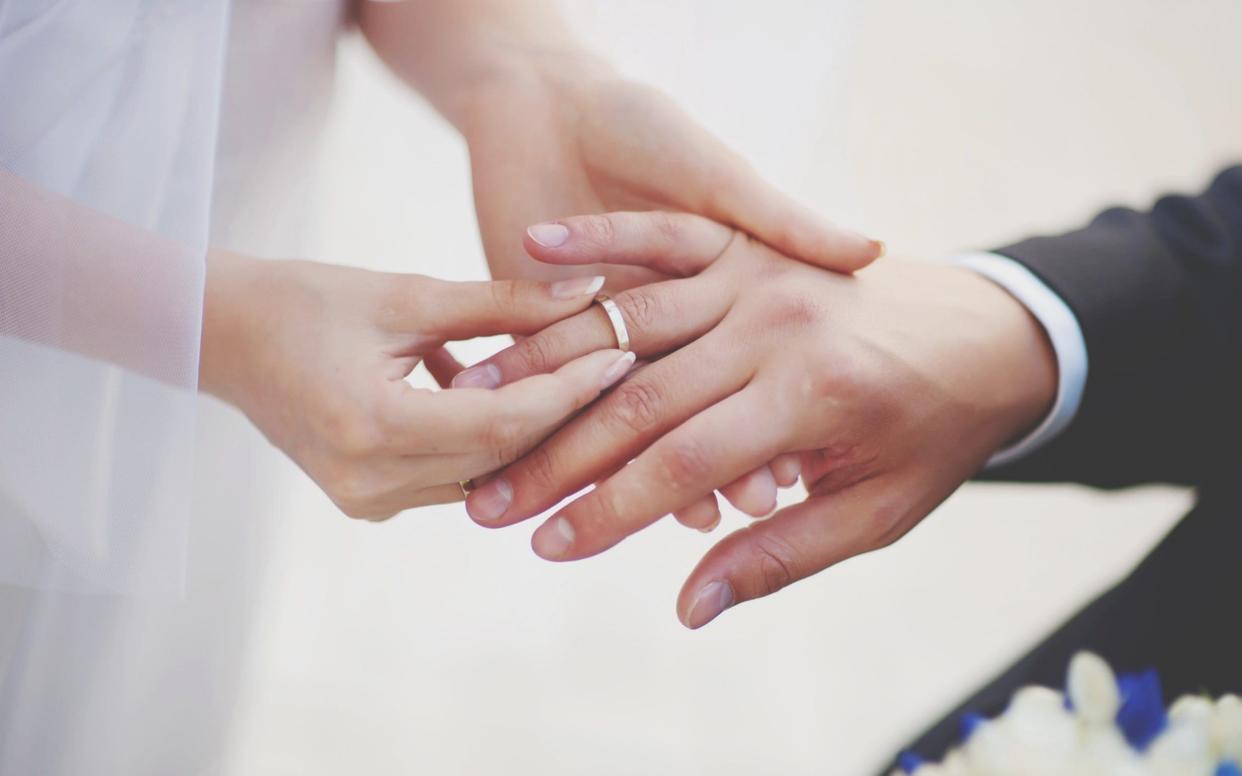Couples told to wash hands before and after exchanging rings in new wedding guidance

Brides and grooms may not be able to kiss and couples will have to wash hands before and after exchanging rings, under new Government rules for weddings.
New coronavirus guidance states that services should be “adapted to remove practices” that break social distancing between people of different households, meaning couples who do not already live together could be forced to hold back from sealing their vows with a traditional kiss.
It is also feared that fathers will not be able to walk daughters down the aisle arm-in-arm unless they live under the same roof. Couples will be required to wash their hands before and after the exchanging of rings when ceremonies are allowed to restart on Saturday.
As part of the nationwide lockdown imposed in March, all religious services including weddings and baptisms were forced to stop.
From July 4, weddings and civil partnerships can resume in England but with only 30 people in attendance including the couple and staff, such as photographers, security or caterers.
Receptions or parties after weddings should not take place, but small celebrations - with groups of up to two households indoors, or up to six people from different households outdoors - will be permitted.
The new guidelines state that only one person should be permitted to sing during the ceremony and they should do so from behind a perspex screen to “further prevent transmission” and protect guests.
Instead of singing hymns or bringing in a live band, services should play musical recordings because of the potential for “increased risk of transmission from aerosol and droplets”.
The advice urges couples to provide disposable orders of service and cash donations will be discouraged, meaning those wanting to support the happy couple should do so online.
Weddings and civil partnerships should be concluded in the “shortest possible time” and limited to the “legally binding” sections of the service.
In Northern Ireland weddings of up to 10 people are allowed outdoors and in Wales, ceremonies can also take place, but social distancing must be observed. Meanwhile, outdoor marriages and civil partnerships can take place in Scotland.
The Department for Housing, Communities & Local Government also unveiled new guidance for places of worship yesterday.
Churchgoers may be required to reserve their pew for services, with the guidelines urging the adoption of a “booking system”. Worshippers are also advised to bring their own bible or holy book to their place of worship with them.
Where this is not possible, books should be cleaned and quarantined for 48 hours since their previous use. Muslims should also bring their own prayer mat to services.
Communion is allowed if it is deemed 'essential,' but worshippers should not drink from the same glass or share the same bread, which could be dispersed pre-wrapped instead.
The priest distributing communion should consider wearing gloves and all those involved in the practice should wash their hands before and after.
No hymns should be sung or wood instruments played as they create an “additional risk of infection”. For Christenings and other water rituals, only “small volumes” should be splashed onto the body and full immersion baptisms “should be avoided”.
Those present for Christenings should stand “distant from any splashes” and parents should hold their children throughout the service. All those involved in water rituals are urged to thoroughly wash their hands before and after such ceremonies.
A Government spokesperson said: “The guidance remains that you should socially distance from anyone you do not live with or who is not in your support bubble.
While we recommend that people keep one metre - with mitigations - apart at weddings, couples are best placed to decide how to apply this guidance to each other to ensure that their wedding can go ahead safely.”

 Yahoo News
Yahoo News 
